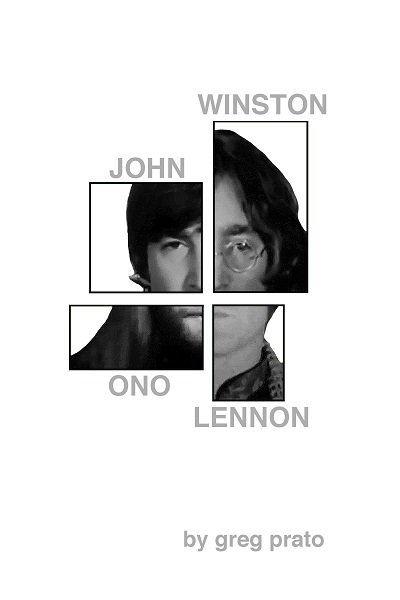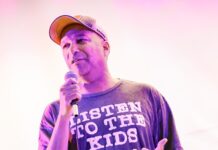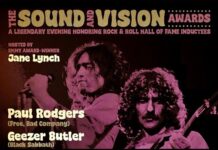December 8, 2020, sadly marks 40 years since the tragic death of the iconic John Lennon. As a tribute, journalist/author Greg Prato has assembled a new book, John Winston Ono Lennon, that features interviews with countless renowned names of the rock world who either were lucky to work alongside Lennon (photographer Bob Gruen, Plastic Ono Elephant Memory Band’s bassist Gary van Scyoc, Cheap Trick drummer Bun E. Carlos, etc.) or were admirers of his music (Deep Purple singer Ian Gillan, ex-Kiss guitarist Ace Frehley, ex-Dream Theater drummer Mike Portnoy, etc.). Below is an excerpt from a chapter entitled ‘Visionary,’ which contains answers to the question, “Has there been another musical artist as fearless and creative as John Lennon?” To order a copy of John Winston Ono Lennon, click here.
###
BOB GRUEN: No. The way he related things in a simple way – common ideas. He once told me that he couldn’t tell people what to do or what to think. But he had a way of summing up what people already thought. Just putting thoughts into words, like, “All we are saying, is give peace a chance.” Something that everybody around the world could relate to. He said that if he tried to go on TV and sell toothpaste, nobody would believe him. They wouldn’t buy toothpaste because John Lennon said so. It wasn’t like he could tell people things. But he could express what they were already thinking. And he knew that. And he was very good at that.
And when he died, he was talking about ecology, he was talking about curbing your appetites for drugs and alcohol. He was talking about a healthy diet. He was talking about being responsible to your family – about caring, about loving. And these were issues that became very important in just the next few years. He was always ahead of his time. And it would have been really great to have him leading that and encouraging that more. The world lost a lot when they didn’t get that world tour.
Because if you want to know about John Lennon, the most you can find out about how he was thinking or what he was thinking, is if you listen to the BBC interview by Andy Peebles, and read the Playboy interview by David Sheff. Both are extensive interviews – particularly, the Playboy interview, which was done over the course of several days. Both have been published as books and are available online.
And in those interviews, it really sums up his philosophy of life. Most of what people like and admire and are inspired by John Lennon were things that he said in the ‘60s and early ‘70s – while he was drunk and traveling around the world, and kind of chaotic. And then he stayed home for five years, raising his son and learning about life. And when he came back in 1980, the way he spoke, the way he expressed his feelings about life were so much more clear and so much more powerful. It’s the world’s loss that he didn’t get to take that message around the world in 1981. And it’s a message the world still needs today.
MITCH WEISSMAN: If not more so, maybe Bowie [was as visionary as John] – and they were friends. It kind of makes sense. Bowie is the perfect example of a visionary. But a guy who left a group and became visionary…probably Roger Waters, David Gilmour. Elton John you don’t think of as a visionary, but he was his own guy, and he was friends with John and godfather to Sean. But Bowie comes to mind – if not so more than any of them. Bob Dylan was in a class by himself – he started out as a folkie, and his songs endured. Joni Mitchell, amazingly so. The Kiss guys obviously, they’re visionary – on a lower level. They’re iconic, so to speak. Dylan definitely was one.
KASIM SULTON: I think David Bowie was. Todd is up there. He is a visionary…and he is fearless. [Laughs] So yeah, I guess so. Unfortunately – for whatever reason – the mass appeal never really caught on for Todd. Although I have said before and will say again that he – along with twenty or a couple of dozen other songwriters – helped shape the second half of the 20th century in pop music. I guess to some degree [there are some comparisons between John and Todd]. There’s that famous letter that John wrote to Todd – because Todd said something kind of snarky about John, and John just laced into him in the letter, and was published in Rolling Stone.
MIKE PORTNOY: Well…yeah – Paul McCartney! I think the two of them share that credit or that role. I think John was more outspoken. John was the one who would always sing for peace and revolution. But I’ve got to give Paul the same amount of credit, and Paul has been doing it now for 60 years, and unfortunately, John didn’t have that time in his life. And John even took five years off towards the end of his life. In those five years, think of what we could have been getting from him during that time – but of course, he devoted it to raising Sean. But has there been anybody else like him? He is one of the biggest and most important voices – not only in rock music, but pop culture – of the last 50 or 60 years. There’s no question about it. But I don’t want to take anything away from Paul being just as important, as well.
BUN E. CARLOS: Oh yeah, buckets of them. There’s Hendrix and those kind of guys. Pete Townshend. The Beatles were a big band from my age group – I’m class of ‘69, so I was in seventh grade in 1964. For me and all the drummers I grew up with, it was kind of like Ringo and Charlie Watts…and maybe Dave Clark – especially for me, I thought Dave and lead drums were cool.
And then three years later, it kind of rolled over to Mitch Mitchell, Ginger Baker, and Keith Moon – because I’d been learning more on the drums, and bands were getting better. But the Beatles…you didn’t cover many Beatles songs after ‘68 or ‘69 – after the big blues thing rolled through. It was more into hard rock, and Cream/Led Zeppelin-y stuff. So, the Beatles’ influence on bar bands kind of faded after that. And then, Badfinger kind of took their place – stuff like that, too.
CURT KIRKWOOD: Well…yeah – Van Gogh was great. As far as musicians go, that’s a tough one. I would say he was just a little bit beyond. Comparisons get a little bit odious, when you’re up in the ether like that. It’s kind of like, you can’t really rank them. On a certain level, I think anybody that does art is visionary. I’m not trying to evaluate effort in any case.
I think for the time, definitely, you had a few people out there – Woody Guthrie was far-out, and Dylan was probably an influence there, with surreal imagery, but still sticking to something there that you could bite into. Lennon seemed to be not as concerned with some of the stuff. He seemed to be more self-involved, which I think is a really bitchin’ point with artists that really feel the need to have any connection to them socially or sign of the times. I like it to be art. And at the time, the Beatles were doing some of their best stuff.
TY TABOR: I personally don’t know if anyone else has been as bold or visionary as John Lennon in music. There is a pretty long list of impressive people but John is the OG – so his place in history is cemented as “king.”
PAUL LEARY: No, I think it’s pretty safe to say there has not. He was groundbreaking and went places that people still struggle to go. There’s been a lot of good musicians over the years, but he was sort of like a “tour guide” – a tour guide that kind of takes you through the growing up process, and the development of consciousness. He was a musician that was able to look at himself the way musicians hadn’t really looked at themselves before. Songs like “I’m a Loser” and “Help!” – there was such a vulnerability. And he was the cutting edge of the Beatles and he was the one that would show people’s vulnerability at the same time. It’s kind of a strange paradox.
CHAD CHANNING: I don’t think so. Hank Williams Sr., he is the guy that set the bar for country music. But for pop music, what the Beatles did, I think John definitely set the bar – for sure. And I can’t think of anyone off-hand at all that was really anything like him or the Beatles, and what they did in music – for all music.
MATT PINFIELD: I think there have been some, but I think he set the template for that. Because he was so ultra-famous from being a Beatle, that I think he was truly at ground zero for that. For somebody to have had that kind of access to the media and didn’t take the easy route ever – he went with whatever he was feeling at the time. Which to me, is complete fearlessness.




















